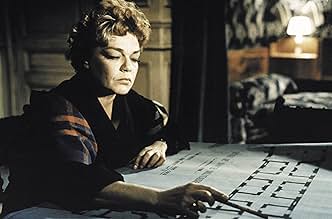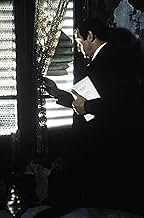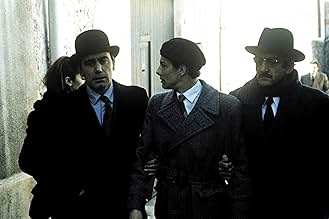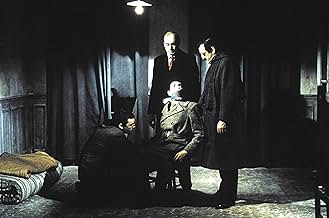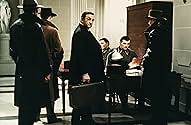IMDb रेटिंग
8.1/10
28 हज़ार
आपकी रेटिंग
अपनी भाषा में प्लॉट जोड़ेंAn account of underground resistance fighters in Nazi-occupied France.An account of underground resistance fighters in Nazi-occupied France.An account of underground resistance fighters in Nazi-occupied France.
- निर्देशक
- लेखक
- स्टार
- पुरस्कार
- 4 जीत और कुल 1 नामांकन
फ़ीचर्ड समीक्षाएं
"L'Armée des ombres" (1969) was shown in the U.S as "Army of Shadows." The film is co-written and directed by Jean-Pierre Melville.
The time is 1942 and the setting is France. Lino Ventura plays Philippe Gerbier, a high-ranking officer in the French resistance. Gerbier is intelligent, resourceful, and brave. He and his small band of urban fighters are constantly in danger of capture and torture by the Nazis. This isn't a film of rural partisans--it's a film where people meet in cafés and offices. No one knows when Nazi soldiers or Gestapo will sweep down and drag them off. No meeting is safe, and no relationship is safe either--how many people can remain silent under savage tortures that go on for days?
Although Ventura is excellent in the role, the movie is dominated by Simone Signoret as Mathilde--tougher and braver than any of the men, but possessing one terrible weakness.
This movie is different than most films about the French Resistance. Things don't go smoothly, they don't go well, fear is everywhere, and heroism often takes place in a prison cell where no one ever learns of it. It's fascinating, but grim.
"Army of Shadows" is a neglected film by a great director. It's definitely worth seeking out.
The time is 1942 and the setting is France. Lino Ventura plays Philippe Gerbier, a high-ranking officer in the French resistance. Gerbier is intelligent, resourceful, and brave. He and his small band of urban fighters are constantly in danger of capture and torture by the Nazis. This isn't a film of rural partisans--it's a film where people meet in cafés and offices. No one knows when Nazi soldiers or Gestapo will sweep down and drag them off. No meeting is safe, and no relationship is safe either--how many people can remain silent under savage tortures that go on for days?
Although Ventura is excellent in the role, the movie is dominated by Simone Signoret as Mathilde--tougher and braver than any of the men, but possessing one terrible weakness.
This movie is different than most films about the French Resistance. Things don't go smoothly, they don't go well, fear is everywhere, and heroism often takes place in a prison cell where no one ever learns of it. It's fascinating, but grim.
"Army of Shadows" is a neglected film by a great director. It's definitely worth seeking out.
Jean-Pierre Melville's "Army of Shadows" is a sombre film about the French Resistance during WWII. It's yet one more movie that makes me feel like I have a terrible grasp of history, as I knew virtually nothing about the movement before seeing this. Melville himself was a member of the Resistance, so I can only assume that his film is fairly accurate. It's powerful, but not obviously so. It doesn't inspire tremendous reactions or emotions while viewing it, but it gets in your head and stays there.
The film is lacking any of that championing of the underdog spirit that infuses so many other stories about scrappy groups resisting the tyranny of the powerful. The members of the French Resistance in this film live like unearthly beings, skittering from one shadowy doorway to another, trying to erase any sign of themselves. The movie suggests that this need for non-existence bleeds into their psychology as well -- the film's main character becomes nearly inhuman in his devotion to the cause and his ability to ruthlessly do away with colleagues when there's a chance that one of them might jeopardize the others. He's not inhuman, but he must do inhuman things, because the desperation of his and his comrades' situations calls for it.
The Criterion Collection's print of the film looks terrific, or at least as terrific as the film's dreary pallet of grey and brown will allow. Melville gives the film an authentic look -- only some scenes set in the London blitz and on an aircraft carrier have a studio set look to them.
A shot of the Arc di Triomphe both opens and closes the film: a symbol of the France that would eventually emerge from the dark days of WWII, or an ironic jab at a country that can't take much credit for fighting off the tyranny of fascism?
Grade: A
The film is lacking any of that championing of the underdog spirit that infuses so many other stories about scrappy groups resisting the tyranny of the powerful. The members of the French Resistance in this film live like unearthly beings, skittering from one shadowy doorway to another, trying to erase any sign of themselves. The movie suggests that this need for non-existence bleeds into their psychology as well -- the film's main character becomes nearly inhuman in his devotion to the cause and his ability to ruthlessly do away with colleagues when there's a chance that one of them might jeopardize the others. He's not inhuman, but he must do inhuman things, because the desperation of his and his comrades' situations calls for it.
The Criterion Collection's print of the film looks terrific, or at least as terrific as the film's dreary pallet of grey and brown will allow. Melville gives the film an authentic look -- only some scenes set in the London blitz and on an aircraft carrier have a studio set look to them.
A shot of the Arc di Triomphe both opens and closes the film: a symbol of the France that would eventually emerge from the dark days of WWII, or an ironic jab at a country that can't take much credit for fighting off the tyranny of fascism?
Grade: A
This is a film about real heroes. Not the flashy Rambo kind, but ordinary men and women who did extraordinary things in a time when France had already surrendered to the Germans. They only numbered a few hundred at most, and they walked in the shadows around France knowing that they would certainly die before it was over. Yet, they moved on and did what they had to without complaint or regret.
You won't see bombs blazing and blood and gore. What you will see is real people who agonize over every death that they are forced to carry out. People who knew that every corner held danger and that they could be betrayed at any time.
These are real heroes and this film portrays them as they were in a somber, intelligent, and dark fashion. The film was made and released in 1969, yet it's awards are in 2006 and 2007, when it was restored and finally presented in this country.
As the films of Jean-Pierre Melville are made available, we are able to share in seeing one of the truly great directors in the world. The pleasure is immeasurable.
You won't see bombs blazing and blood and gore. What you will see is real people who agonize over every death that they are forced to carry out. People who knew that every corner held danger and that they could be betrayed at any time.
These are real heroes and this film portrays them as they were in a somber, intelligent, and dark fashion. The film was made and released in 1969, yet it's awards are in 2006 and 2007, when it was restored and finally presented in this country.
As the films of Jean-Pierre Melville are made available, we are able to share in seeing one of the truly great directors in the world. The pleasure is immeasurable.
Jean Pierre Melville, writer/director of Army of Shadows, has said in interviews that the book of which he based his movie from is considered THE book on the French resistance in the second world war. While I can only speculate as to this film being THE film of its category, as I've yet to see other films on the resistance, it sets quite a high standard for painting a very calculated, perfectly cool (or cold on your POV) piece of film-making on the subject.
It's basically as if Melville, having lived through the period- this being perhaps an even more personal film than his other crime films- still takes on some of the true knacks of what he does in the rest of his oeuvre. Taking characters who go by codes of loyalty, professional as can be, and in a true underground in society. However this time their opponent being the Germans instead of the police the stakes are raised. Even as a couple of parts in the middle seem to shake with the deliberate pace Melville sets a couple of times, the main core of the story and the characters is remarkable, and honest in a dark, bleak way.
Lino Ventura is at his best as Gerbier, a main man in the French resistance movement, who gets more involved in the proceedings following a brief prison-camp stint (the escape from which is one of the most daring in any film). The film is fairly episodic, however encompassing a group of the resistance people, including Mathilde (Simon Signet, very good as always), Le Masque (Claude Mann), and Jean-Francois (Jean-Pierre Cassel, at a peak as well in his own way).
Some of their operations are simple, like retrieving weapons or finding more support through certain channels. Though here and there some payback is in due to the traitors. This becomes a higher issue as the film rolls into its final act, as alliances come into question, and the real ties of humanity together are tested in the midst of the German occupation.
As usual with Melville all of this is told, in its own way, fairly simply- almost clinically- by Melville's camera. There are some zooms here and there, some very intense camera positions (though not awkwardly), and exciting when need be. At the same time, there are some scenes like a short scene on a beach (all blue) or a few others at night or in different lighting modes that are the best Melville's done in the midst of a color scheme used perfectly to correspond with the mood; it works just as well if not better than how he uses it for his crime films.
But one of the pleasures of seeing a film like this by a real kind of maverick of European cinema is seeing how much room he gives for his actors. These are not performances that become over-sensational in the slightest. On the contrary, what adds sometimes to the tension in some of the scenes, or the outright tragedy, is how the actors just play as they do professional-wise, sometimes with what's not said meaning more (and how the Melville gets these quiet moments is fantastic). Featuring a superlative musical accompaniment by Eric De Marsan, this is one of the best directed anti-war films ever made.
It's basically as if Melville, having lived through the period- this being perhaps an even more personal film than his other crime films- still takes on some of the true knacks of what he does in the rest of his oeuvre. Taking characters who go by codes of loyalty, professional as can be, and in a true underground in society. However this time their opponent being the Germans instead of the police the stakes are raised. Even as a couple of parts in the middle seem to shake with the deliberate pace Melville sets a couple of times, the main core of the story and the characters is remarkable, and honest in a dark, bleak way.
Lino Ventura is at his best as Gerbier, a main man in the French resistance movement, who gets more involved in the proceedings following a brief prison-camp stint (the escape from which is one of the most daring in any film). The film is fairly episodic, however encompassing a group of the resistance people, including Mathilde (Simon Signet, very good as always), Le Masque (Claude Mann), and Jean-Francois (Jean-Pierre Cassel, at a peak as well in his own way).
Some of their operations are simple, like retrieving weapons or finding more support through certain channels. Though here and there some payback is in due to the traitors. This becomes a higher issue as the film rolls into its final act, as alliances come into question, and the real ties of humanity together are tested in the midst of the German occupation.
As usual with Melville all of this is told, in its own way, fairly simply- almost clinically- by Melville's camera. There are some zooms here and there, some very intense camera positions (though not awkwardly), and exciting when need be. At the same time, there are some scenes like a short scene on a beach (all blue) or a few others at night or in different lighting modes that are the best Melville's done in the midst of a color scheme used perfectly to correspond with the mood; it works just as well if not better than how he uses it for his crime films.
But one of the pleasures of seeing a film like this by a real kind of maverick of European cinema is seeing how much room he gives for his actors. These are not performances that become over-sensational in the slightest. On the contrary, what adds sometimes to the tension in some of the scenes, or the outright tragedy, is how the actors just play as they do professional-wise, sometimes with what's not said meaning more (and how the Melville gets these quiet moments is fantastic). Featuring a superlative musical accompaniment by Eric De Marsan, this is one of the best directed anti-war films ever made.
If you have any interest whatsoever in French cinema, World War II, moral ambiguity, or Simone Signoret, see this film.
Filmed in a cold, documentary-like style, the "Shadow Army" tells the intertwining stories of several members of the French resistance. The movie defies any sort of simple categorization. It is a thriller without being thrilling. It is a spy story without a single gadget. It portrays the tedium of the task without being boring. Finally, it tells a story of heroic courage without the benefit of a single hero. That last point isn't immediately evident and you are free to disagree, of course, but heroes (as defined in the usual movie terms) are hard to come by in this story.
A popular adage goes; one person's terrorist is another person's freedom fighter. This movie serves up proof to that lie. There are true freedom fighters that will never be labeled "terrorist" and you will meet them during the course of this film. The movie makes clear that they, and the ones around them, paid a high price in pursuit of freedom. Not just in life and limb, but in moral conviction. As the movie unfolds, I found myself asking, is this action justified? The answer, of course, is that it most certainly is. The better question is would I, or anyone I know, have the courage to do what had to be done.
The technical aspects of the film are all first rate even though a bit below the best of European cinema at the time. (In some ways, the lack of high definition color and sets give it a feel much more in keeping with the time it portrays.) The actors disappear into their roles and there is not a star-turn to be found.
According to the announcement made before the screening I attended, it is being released in the United States on May 12, 2006, just before the summer blockbuster crush. Why that date and why now, almost 30 years after it was made, I do not know. My guess is it probably has something to do with money. (Doesn't it always?) Whatever the reasons, skip the Tom Cruise vehicle and don't miss the opportunity to see it.
Filmed in a cold, documentary-like style, the "Shadow Army" tells the intertwining stories of several members of the French resistance. The movie defies any sort of simple categorization. It is a thriller without being thrilling. It is a spy story without a single gadget. It portrays the tedium of the task without being boring. Finally, it tells a story of heroic courage without the benefit of a single hero. That last point isn't immediately evident and you are free to disagree, of course, but heroes (as defined in the usual movie terms) are hard to come by in this story.
A popular adage goes; one person's terrorist is another person's freedom fighter. This movie serves up proof to that lie. There are true freedom fighters that will never be labeled "terrorist" and you will meet them during the course of this film. The movie makes clear that they, and the ones around them, paid a high price in pursuit of freedom. Not just in life and limb, but in moral conviction. As the movie unfolds, I found myself asking, is this action justified? The answer, of course, is that it most certainly is. The better question is would I, or anyone I know, have the courage to do what had to be done.
The technical aspects of the film are all first rate even though a bit below the best of European cinema at the time. (In some ways, the lack of high definition color and sets give it a feel much more in keeping with the time it portrays.) The actors disappear into their roles and there is not a star-turn to be found.
According to the announcement made before the screening I attended, it is being released in the United States on May 12, 2006, just before the summer blockbuster crush. Why that date and why now, almost 30 years after it was made, I do not know. My guess is it probably has something to do with money. (Doesn't it always?) Whatever the reasons, skip the Tom Cruise vehicle and don't miss the opportunity to see it.
क्या आपको पता है
- ट्रिवियाCinematographer Pierre Lhomme claimed that the last surviving, watchable print of the movie had turned completely pink with age. He later supervised the 2k resolution, digital restoration of the film at the Eclair Laboratories in Paris.
- गूफ़In the London WWII sequence, double yellow lines are visible on the road. These were only introduced in the UK in 1956 and didn't become common until the 1960s; a few of the street signs have a style not known before the 1960s.
- भाव
Philippe Gerbier: See you, Comrade.
Legrain: You a communist?
Philippe Gerbier: No. But I do have comrades.
- कनेक्शनFeatured in Mémoires pour Simone (1986)
टॉप पसंद
रेटिंग देने के लिए साइन-इन करें और वैयक्तिकृत सुझावों के लिए वॉचलिस्ट करें
विवरण
- रिलीज़ की तारीख़
- कंट्री ऑफ़ ओरिजिन
- भाषाएं
- इस रूप में भी जाना जाता है
- Army of Shadows
- फ़िल्माने की जगहें
- Bunker de l'armée, Saint-Cyr-l'Ecole, Yvelines, फ़्रांस(execution by the Gestapo)
- उत्पादन कंपनियां
- IMDbPro पर और कंपनी क्रेडिट देखें
बॉक्स ऑफ़िस
- US और कनाडा में सकल
- $8,61,983
- US और कनाडा में पहले सप्ताह में कुल कमाई
- $12,620
- 30 अप्रैल 2006
- दुनिया भर में सकल
- $9,31,732
इस पेज में योगदान दें
किसी बदलाव का सुझाव दें या अनुपलब्ध कॉन्टेंट जोड़ें






